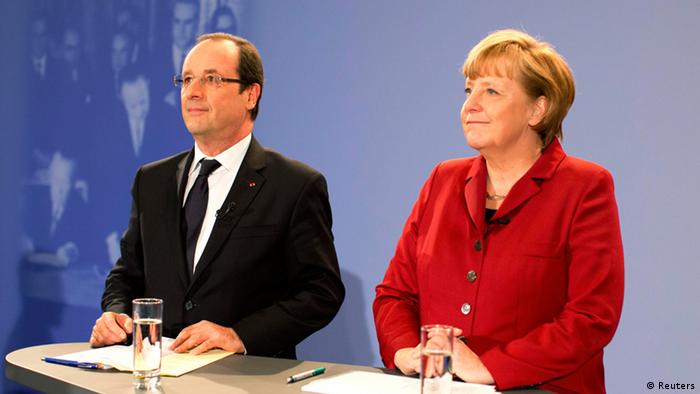President Francois Hollande and Chancellor Angela Merkel have launched a full day of activities marking 50 years since the signing of the Elysee Treaty. The 1963 accord cemented peace between Europe's old adversaries.
French President Hollande received Chancellor Merkel at France's Berlin embassy on Tuesday morning, officially beginning Tuesday's celebrations.
Subsequently, the pair met with French Prime Minister Jean-Marc Ayrault and German President Joachim Gauck at his Schloss Bellevue palace in the capital.
On January 22, 1963, Germany and France signed the Elysee Treaty - the cornerstone of modern peace between the two countries after three wars in less than a century. Post-war leaders Konrad Adenauer of Germany and Charles de Gaulle of France signed that original document.
A joint Franco-German cabinet meeting, followed by a simultaneous meeting of the parliaments in Paris and Berlin with keynote speeches from Hollande and Merkel, were billed as the highlights of Tuesday's agenda.
The two houses of parliament were expected to agree on further measures of cooperation; several partnership agreements and commitments for regular political summits are among the existing terms of the Elysee Treaty.
Fabius warns against more recent nostaliga
French Foreign Minister Laurent Fabius told the German public radio station Deutschlandfunk on Tuesday that he considered the two countries were at "eye level."
"Our relations are supported by a mutual respect and the insight that nobody is entitled to give the other any schoolmasterly lectures," Fabius said.
He also warned Germans against glorifying the previous administration of Nicolas Sarkozy, saying that even then, there were "highs and lows" in Franco-German cooperation. The more conservative Sarkozy was considered a closer ideological match to Merkel's Christian Democrats than Hollande.
France and Germany combined make up a powerful bloc within the European Union, whose voting allocations are doled out on the basis of population. Hollande alluded to the importance of Franco-German "dominance" of the EU in his speech on Saturday.
"The Europeans look upon Franco-German relations in a special way," Hollande said. "When we are on good terms, they worry this might be to their disadvantage. And when we are not on good terms, they realize this is to their disadvantage."
Merkel and Hollande on Monday welcomed 200 young French and German people to the chancellery.
msh/ipj (AFP, dpa, Reuters) dw de

Comments